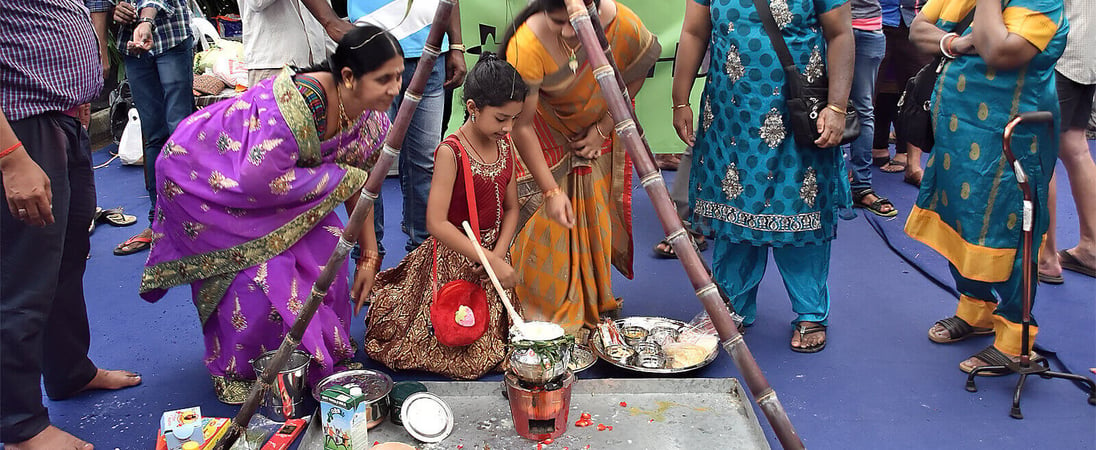
Pongal
Pongal is a vibrant harvest festival celebrated with great enthusiasm in South India. It honors the sun, nature, and the farmers who bring food to the table.
Families gather to offer thanks for the year’s abundance, making it a time filled with joy and gratitude. The name “Pongal” also refers to a special dish made with rice, symbolizing the overflow of blessings. Homes come alive with decorations, and the air fills with the sweet scent of sugarcane and turmeric.
The festival is more than just a celebration—it reflects a deep connection to the land and seasons. People dress in bright clothes, visit each other’s homes, and share festive meals.
Communities come together, expressing unity and appreciation for nature’s gifts. It’s a time when both the rich harvest and the shared spirit of giving are remembered, bringing warmth and happiness to every corner.
How to Celebrate Pongal
Cook Traditional Pongal
Start the day by cooking the dish that gives the festival its name. Use fresh rice, milk, and jaggery to make a delicious, sweet Pongal.
For an extra twist, some people like to add ghee, nuts, or raisins. It’s a simple yet meaningful way to embrace the spirit of the celebration.
Decorate with Kolam
Brighten up your home by creating colorful rangoli designs, known locally as kolam. Use rice flour and vibrant powders to form beautiful patterns at the entrance.
As tradition says, this not only invites positivity but also impresses any passing cows.
Visit Friends and Family
Pongal is the perfect excuse to catch up with loved ones. Spend time with family and friends, enjoying tasty treats and laughter.
Sharing food and memories makes the celebration even more special. It’s a fun way to spread joy and connection.
Celebrate Nature’s Gifts
Take a moment to honor nature’s bounty. Plant a small tree or decorate your house with fresh flowers and sugarcane.
This act represents gratitude for all that the earth provides. Even a simple walk outside can deepen your appreciation for the beauty around you.
Have a Cattle Show
For a quirky touch, attend or watch a local cattle parade if there’s one nearby. Farmers often dress up their cows in bells and bright colors for this tradition. It’s an entertaining and meaningful way to see how animals are celebrated during this time.
History of Pongal
Pongal has roots in ancient Tamil culture, dating back over a thousand years. It started as a way for people to thank the sun, the earth, and the farmers for the harvest.
Although no one knows exactly who first began the celebration, it’s believed that Tamil farmers were among the first to honor nature this way.
Many think the festival could have begun during the Sangam period, around 200 BCE to 300 CE. During this time, agriculture was a central part of life, making a harvest festival crucial. Farmers saw it as a time to express gratitude for their bountiful crops.
In Hindu tradition, Pongal is also linked to legends of gods blessing the earth. Over the centuries, these stories added a religious layer to the celebration, making Pongal not only a thank-you to nature but also a spiritual occasion.
The festival has evolved, but it has kept its essence of appreciation and unity. Today, it continues to bring families and communities together to honor both nature and tradition.
Also on ...
View all holidaysNational Dress Up Your Pet Day
Set up a literal catwalk and treat your furry friends to some safe, comfortable fashion, organize a fun photo shoot or go all out with matching outfits.
National Organize Your Home Day
Unleash the satisfying feeling of decluttering, creating a fresh space that invites relaxation and productivity in everyday life.
National Hot Pastrami Sandwich Day
Tender slices of meat piled high on rye bread and topped with mustard. One bite and you'll be transported to the heart of New York City.
International Kite Day
Soaring objects in the sky, dancing and twirling in the wind! A fun way to bring color and joy to any outdoor space.







